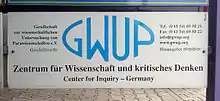An eingetragener Verein (German: [ˈaɪnɡəˌtʁaːɡənɐ fɛʁˈʔaɪn]; "registered association" or "incorporated association"), abbreviated e. V. (German: [ˌeːˈfaʊ]), is a legal status for a registered voluntary association in Germany. While any group may be called a Verein, registration as eingetragener Verein confers many legal benefits, because it confers the status of a juridical person rather than just a group of individuals. The legal status must be mentioned in the name as well. Like certain other corporate bodies, an eingetragener Verein can apply for the status of a charitable organization (Gemeinnützigkeit).
History
The oldest known social club is La Court de Bonne Compagnie, established in London and mentioned in 1413. The club was set up by a group of devout Templars for the purpose of "charitable causes". To represent the professional interests of craft and merchant guilds, societies or clubs were formed in the Middle Ages and Early Modern period, through which community and various social functional spaces (such as guild houses and music guilds of the Meistersinger) and events were run.
Societies based on language were formed in the seventeenth century, with exclusive English upper class gentlemen's clubs of the eighteenth century, Masonic lodges, the literary societies of the Enlightenment, and political clubs of the French Revolution being some of the earliest examples. One of the most notable social clubs of the early period was the Berliner Montagsclub, founded in 1749.
The first cross-class associations were founded in German-speaking coutries during the 18th century. As a result of industrialisation during the nineteenth century, modern clubs, societies and federations began to develop, including those focused on culture, education and socialising.
Legal basis
The term 'association' is commonly used interchangeably with e.V. along with 'club', 'society', and other classifications denoting non-profit entities. This term refers to the right of citizens to unite under a common purpose and strive for common goals together. The right of free assembly is also one that can be derived directly from laws regarding personal freedom.
The Civil Code of Germany regulates registered non-profit, and for-profit associations regarded as juridical persons (Vereine) in sections 21–79 and any other associations by contract (Gesellschaften) in sections 705–740. The Verein is the basic type of a juridical person while the Gesellschaft is dogmatically more a partnership. Due to this theoretical distinction, the concept of Verein is also the legal basis for particular economic entities (Kapitalgesellschaften) such as GmbH and Aktiengesellschaft, which are also endowed with juridical personhood. These are regulated in separate statutes as special economic associations but bear the same basic features.
The Gesetz zur Regelung des öffentlichen Vereinsrechts (VereinsG) ("Act regulating the public law of associations") and the associated regulations Verordnung zur Durchführung des Gesetzes zur Regelung des öffentlichen Vereinsrechts (Vereinsgesetz) ("Regulation implementing the Act regulating ...") contain specific provision on the rights and duties of Vereine in general.
All natural and juridical persons in Germany, municipalities, counties, and other entities under public law, can form associations and be members of an association. This means that associations are not limited to private clubs formed by natural persons but have a much broader scope. They can be locally limited club-like institutions but also nationwide units representing important economic or social groups. It is even possible that registered associations themselves form a new association whose membership is composed entirely of associations (often called Dachverband).
The statutory minimum number of members for forming a registered association is seven. The minimum number of members before a registered association needs to be dissolved is three.[2] The largest associations can have over one million members, there is no legal limit concerning membership numbers.

Registration
The registration of Vereine is regulated in the Vereinsregisterverordnung (VRV)[3] ('Regulations for the registry of associations'). It requires registration of an e.V. with the association registry (Vereinsregister) either kept at the district court of its seat or, if directed by state law, as a centralized register for the Land its seat is located in.
Differences to other jurisdictions
In other German-speaking countries such a distinction does not exist. But there may be legal requirements which oblige an association to register itself; for example, in Switzerland there is no association registry, but an association must be listed in the commercial register if its yearly turnover is high enough to legally require an audit (Revisionspflicht). In Austria, all associations are registered in a special register, and having an e. V. in the name is not allowed.[1]
References
- 1 2 "BMI". Archived from the original on 19 July 2017.
- ↑ "§ 73 BGB – Einzelnorm".
- ↑ "Vereinsregisterverordnung". Gesetze im Internet – VRV (in German). Federal Ministry of Justice. Retrieved 23 January 2020.
Further reading
- "Eingetragener Verein" [Registered association]. Rechtswörterbuch.de (in German). Archived from the original on 18 September 2012.
- "German Civil Code (BGB)". Gesetze im Internet – German Civil Code BGB. Federal Ministry of Justice. Retrieved 23 January 2020.
- "Gesetz zur Regelung des öffentlichen Vereinsrechts" [Act for the Regulation of Public Association Law]. Gesetze im Internet (in German). Federal Ministry of Justice. Retrieved 23 January 2020.
- "Verordnung zur Durchführung des Gesetzes zur Regelung des öffentlichen Vereinsrechts (Vereinsgesetz)" [Regulations for the Enforcement of the Act Regulating Public Association Law]. Gesetze im Internet – VereinsGDV (in German). Federal Ministry of Justice. Retrieved 23 January 2020.
